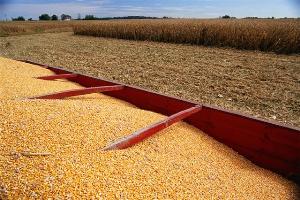Unmatched: Global Population versus Agriculture's Capabilities
Reflections on TIME's "A Future of Price Spikes"
By Pearse Lyons
The year was 1798, and emerging technologies were opening doors to a new frontier, even the hope of a utopian society. Yet one man, Thomas Malthus, had a dire prediction. "The power of the population is indefinitely greater than the power in the earth to provide subsistence of man." Simply put, Malthus envisioned a trajectory in which human population would exponentially grow, far outpacing agricultural output.

40% of America's corn harvest is now used to manufacture ethanol.
Was Malthus correct? Today:
-925 million people go to bed hungry each night
-We add 219,000 extra mouths to the globe each day
-In the 2010-2011 season, we consumed more grain than we produced
-Food costs 39% more than it did just one year ago, and prices may rise as much as 30% more over the next decade
-Meat consumption has doubled over the past three decades
-40% of America's corn harvest is now used to manufacture ethanol enough to feed 350 million people
-Governments are significantly decreasing their investments in agriculture research and development, yet $200 billion in agricultural investment will be needed each year in the developing world to meet demand. This would represent a 50% required increase from current levels.
Furthermore, the U.N.'s Food and Agriculture Organization projects that food must increase 70% by 2050 in order to meet the demands of a historic population of 9 billion.
The reports are simply staggering. We are facing a dire situation. Perhaps, it's more correct to label our future as one of crisis.
Yet I see hope.
Did innovation and the power of ingenuity play any roles in Malthus' equation? I don't believe so. As Hafez Ghanem, assistant director-general, aptly assessed the situation. We have the technology and resources to solve the problem. What is needed is the political will.
I'd take this a step further. What is needed is the individual will, the industry will. Our destiny, for better or for worse, is in our own hands.
In many cases, we have the technology to address these issues, and where we don't, we have the aptitude and fortitude to seek out solutions.
At Alltech, we see a revolution on the horizon that will transform the way our world produces food and cares for its own inhabitants. It's a future ripe with opportunities to use previously unusable feedstuffs like switchgrass through enzymatic processes and to replace fishmeal with algae. And, these two examples, my friends, are just the tip of the iceberg.
Crises birth opportunity; most of you know I'm a strong proponent of this philosophy. The clock is ticking, and each of us has a choice to make.
Fear, ignorance, or innovation - on which one will you stand?
TIME's "A Future of Price Spikes" article can be read here.
All Categories
Archives
- 五月 2014 (6)
- 二月 2014 (1)
- 八月 2013 (1)
- 七月 2013 (1)
- 六月 2013 (4)
- 五月 2013 (17)
- 九月 2012 (1)
- 八月 2012 (22)
- 七月 2012 (1)
- 五月 2012 (24)
- 四月 2012 (2)
- 三月 2012 (12)
- 一月 2012 (7)
- 十二月 2011 (10)
- 十一月 2011 (12)
- 十月 2011 (2)
- 九月 2011 (4)
- 八月 2011 (12)
- 七月 2011 (10)
- 六月 2011 (11)
- 五月 2011 (35)
- 四月 2011 (4)
- 三月 2011 (10)
- 二月 2011 (12)
- 一月 2011 (13)







